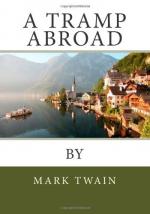CHAPTER XXXI [Alp-scaling by Carriage]
We now prepared for a considerable walk—from Lucerne to Interlaken, over the Bruenig Pass. But at the last moment the weather was so good that I changed my mind and hired a four-horse carriage. It was a huge vehicle, roomy, as easy in its motion as a palanquin, and exceedingly comfortable.
We got away pretty early in the morning, after a hot breakfast, and went bowling over a hard, smooth road, through the summer loveliness of Switzerland, with near and distant lakes and mountains before and about us for the entertainment of the eye, and the music of multitudinous birds to charm the ear. Sometimes there was only the width of the road between the imposing precipices on the right and the clear cool water on the left with its shoals of uncatchable fish skimming about through the bars of sun and shadow; and sometimes, in place of the precipices, the grassy land stretched away, in an apparently endless upward slant, and was dotted everywhere with snug little chalets, the peculiarly captivating cottage of Switzerland.
The ordinary chalet turns a broad, honest gable end to the road, and its ample roof hovers over the home in a protecting, caressing way, projecting its sheltering eaves far outward. The quaint windows are filled with little panes, and garnished with white muslin curtains, and brightened with boxes of blooming flowers. Across the front of the house, and up the spreading eaves and along the fanciful railings of the shallow porch, are elaborate carvings—wreaths, fruits, arabesques, verses from Scripture, names, dates, etc. The building is wholly of wood, reddish brown in tint, a very pleasing color. It generally has vines climbing over it. Set such a house against the fresh green of the hillside, and it looks ever so cozy and inviting and picturesque, and is a decidedly graceful addition to the landscape.
One does not find out what a hold the chalet has taken upon him, until he presently comes upon a new house —a house which is aping the town fashions of Germany and France, a prim, hideous, straight-up-and-down thing, plastered all over on the outside to look like stone, and altogether so stiff, and formal, and ugly, and forbidding, and so out of tune with the gracious landscape, and so deaf and dumb and dead to the poetry of its surroundings, that it suggests an undertaker at a picnic, a corpse at a wedding, a puritan in Paradise.
In the course of the morning we passed the spot where Pontius Pilate is said to have thrown himself into the lake. The legend goes that after the Crucifixion his conscience troubled him, and he fled from Jerusalem and wandered about the earth, weary of life and a prey to tortures of the mind. Eventually, he hid himself away, on the heights of Mount Pilatus, and dwelt alone among the clouds and crags for years; but rest and peace were still denied him, so he finally put an end to his misery by drowning himself.




